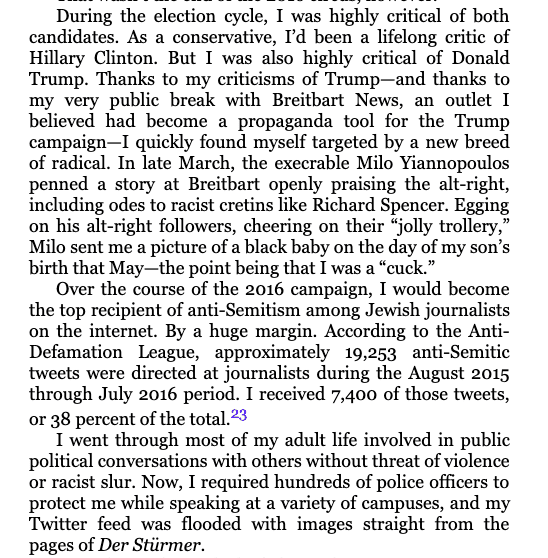Good Grief. Ben Shapiro Is Not Alt-Right

Don’t know if you heard about it or not, but this week, The Economist magazine smeared the conservative writer Ben Shapiro by calling him a member of the alt-right, and a “radical conservative.” (The magazine apologized when it was called out.) It was a stunning move, given how much alt-right polemicists despise Shapiro, a religious Jew who has had to endure an immense amount of anti-Semitic abuse from them. It doesn’t require much googling to discover this. Shapiro is, in fact, a conventional conservative of the Anglo-American strain, and a gifted debater and writer. He is not remotely a figure of the alt-right, and not a “radical” in any way (except being radically good at getting his point across). It is really remarkable that a magazine of The Economist‘s caliber made that fundamental error. It brings to mind that crackpot 2017 analysis of religion and US conservative politics made by an Italian Jesuit and an Argentinian Calvinist, who beclowned themselves by the act.
Read that Economist interview with him and see if there’s anything remotely radical or alt-right in it. In fact, the hook for the interview was his new book, The Right Side Of History: How Reason And Moral Purpose Made The West Great . In the first few paragraphs, Shapiro writes:

That’s all you had to read to know that this guy Shapiro, whatever he is, ain’t an alt-rightist or a “radical conservative.” But the Economist figured they knew better.
David Marcus says that The Economist, the flagship journal of globalist neoliberalism, got this basic fact about Ben Shapiro wrong because the Left simply does not understand conservatism to begin with. This is because so many senior journalists live in a bubble where elementary distinctions among conservatives are invisible to them. Excerpt:
The best antidote to this problem is better literacy regarding the conservative movement in mainstream outlets. When Kevin Williamson can’t work at the Atlantic, when the very moderate conservatives at the New York Times are pilloried as extremists, and when the Washington Post pretends its ex-conservative columnists represent anything but a small cabal of die-hard NeverTrumpers, readers get a skewed and distorted vision of conservatives that blurs the very real and bright line between the right and the alt-right.
Favoring control of the border and more limited illegal immigration is not an alt-right position unless it is rooted in the belief that such immigration forebodes white genocide. Opposing affirmative action is not an alt-right position unless it is rooted in pseudo-scientific babbling about the racial superiority of white people. Opposing foreign wars is not an alt-right position unless it is rooted in the belief that Jews and Israel are pulling the purse strings that send American soldiers to their death.
Conflating these positions is a very dangerous thing. It creates an environment in which liberals and progressives feel it not only an option but also, often, a duty to not engage with very mainstream conservative ideas. Calling Ben Shapiro a sage of the alt-right is meant to do exactly what protesters who de-platform his speeches do: Keep people from hearing his ideas rather than simply disagreeing with them.
If the only thing you knew about right-of-center populist/nationalist movements in continental Europe was what you read in the US and UK media, you would think that fascists are on the march. There really are some fascists on the march in Europe — but you absolutely cannot trust our media to tell you who they are. For example, here’s a headline in the conservative (!) Telegraph right now:

The story is actually interesting, and tells us something about the Vox party. Excerpt:
Abroad such influence is likely to be seen as further evidence of public discontent manifesting itself in political extremism – from Golden Dawn in Greece to the Front National (FN) in France. But Mr Espinosa [the Vox leader] is keen to distinguish Vox from those parties, and says he would “never appear on a platform with them” or with a leader like France’s Marine Le Pen. The only thing Vox shares with the FN, he says, is its hard line on immigration. He wants Spain to be able to say “how many [immigrants] and which ones” are allowed in and demand those arriving “accept the basic rules that the Western world has developed to create the most advanced civilisation in world history.”
Vox is usually described in Spain’s left-dominated press, and in the Anglo-American media, as “far right.” Vox’s actual positions are pretty much where many in the US Republican Party is on key issues. It’s economically liberal (that is, pro-market), for immigration restriction, critical of multiculturalism, and pro-life. It opposes same-sex marriage, but favors civil unions for gay couples. Vox is somewhat skeptical of the EU, and believes in protecting Spanish sovereignty. Vox wants to repeal a “gender violence” law that it believes discriminates against males, replacing it with one that applies equally to males and females.
Of course, El País calls Vox “far-right” — as did The New York Times in January, adding “anti-immigrant” as well. It is certainly true that Vox is hostile to the immigration status quo in Spain, which took in more migrants in 2018 than any other European country — over 57,000, which represents about half the total that entered European territory. When I was in Sevilla earlier this year, one of the people who came to hear my talk told me that his relative there in Andalucia works for the Spanish coast guard, and is on the front lines of the migration surge. He was so fed up with what is happening with the lawlessness, and how nobody in Madrid seems to care, that he voted for Vox.
Does this make that man “far right”? I don’t know about you, but my idea of “far right” is, you know, fascism, not simply wanting one’s nation to control its borders.
You call people like Ben Shapiro alt-right, and you demonize ordinary right-of-center parties as “far right,” and convince yourself that they are that, you are actually helping the bad guys. You really are.
Subscribe for as little as $5/mo to start commenting on Rod’s blog.